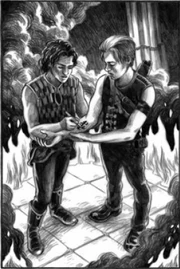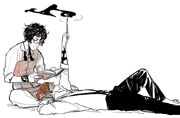Friendship/Combine rune
Parabatai is a pair of Nephilim warriors who fight together as lifelong partners, bound together by oath, regardless of their gender. Their bond is not reflected only in their closeness and willingness to lay down their lives for one another, but also in oath—one sworn in front of the Council.
Not all Shadowhunters are required to have parabatai; it is actually less common to have them. A Shadowhunter has only eighteen years to find and choose a parabatai; once older than that, the ritual is no longer open to the Shadowhunter.
Ritual

David and Jonathan
Will and Jem

James and Matthew
Cordelia and Lucie
Michael and Robert
Jace and Alec
Jules and Emma
Today, parabatai must be bonded in childhood; that is, before either has turned eighteen years old. They are not merely warriors who fight together; the oaths that newly made parabatai take in front of the Council include vows to lay down one's life for the other, to travel where the other travels, and indeed, to be buried in the same place. The Marks of parabatai are then put upon them.
The first two male Shadowhunters Jonathan and David fought side by side as the first parabatai. Tradition tells that the ritual they performed was quite different from the current one: they took each other's blood, spoke the words of the oath, and inscribed the runes of binding upon each other.[1]
Oath
The words of the Parabatai Oath must be said in a ceremony, where each person draws the parabatai rune on their partner.
Entreat me not to leave thee,
Or return from following after thee—for whither thou goest, I will go,
And where thou lodgest, I will lodge.
Thy people shall be my people, and thy God my God.
Where thou diest, will I die, and there will I be buried.
The Angel do so to me, and more also, if aught but death part thee and me.
Bond
A Shadowhunter may choose only one parabatai in his lifetime and cannot perform the ritual more than once. Most Shadowhunters never have any parabatai at all; so ever being fortunate enough to find someone worthy of becoming ones' parabatai is considered a blessing.
The parabatai runes placed upon them enable them to draw on each other's strength in battle. They also maintain a strong connection between one another and are able to sense each other's life force; Shadowhunters who have lost their parabatai describe being able to feel the life leave their partner. In addition, Marks made by one parabatai upon another are stronger than other Marks, and there are Marks that only parabatai can use, because they draw on the partners' doubled strength.
The only bond forbidden to the parabatai is the romantic bond. As upheld by the Clave and written into the Shadowhunter's Codex, these bonded pairs must maintain the dignity of their warrior bond and must not allow it to transform into the earthly love referred to as Eros. Most Shadowhunters don't know the reason, but it apparently stems from a dark Clave secret. The Shadowhunter-troubadours' in the late Middle Ages made several songs depicting the forbidden love of parabatai pairs and the inescapable tragedies, both of heartache and magical disaster, that befell them when they become romantically linked.[1]
Severance
Like the marriage bond, the parabatai bond is broken, normally, only by the death of one of the members of the partnership. However, the binding can also be cut in some rare circumstances: if one becomes a Downworlder, if one leaves his life as a Shadowhunter to be with a mundane, and if one is exiled.[2] When one becomes a Silent Brother or an Iron Sister, the bond dissolves naturally as the Marks of transformation that new oblates take are among the most powerful that exist and overwhelm and dissolve the parabatai Marks of binding just as they overwhelm and dissolve more ordinary warrior's Marks.
It is stated that when the bond is severed, the partner/s feel the connection break.
History
| “ | And it came to pass... that the soul of Jonathan was knit with the soul of David, and Jonathan loved him as his own soul... Then Jonathan and David made a covenant, because he loved him as his own soul. | ” |
–1 Samuel 18:1–3, The Shadowhunter's Codex | ||
It is an ideal of warrior comradeship that goes back a long time. The idea of parabatai bonds came from an old tale, particularly the biblical tale of David and Jonathan, warriors who loved each other dearly and whose souls were knit together by Heaven after forming a covenant. Out of that story, Jonathan Shadowhunter and his companion David, who were coincidental namesakes of the biblical ones, took the idea of parabatai, and encoded the ceremony into the Law.[1]
Known Parabatai
- Jonathan Shadowhunter and David the Silent (split by David's Silent Brotherhood)
- Silas Pangborn and Eloisa Ravenscar (split by Silas' death)
- Jem Carstairs and Will Herondale (split by Jem's Silent Brotherhood and Will's death)
- James Herondale and Matthew Fairchild
- Cordelia Carstairs and Lucie Herondale
- Michael Wayland and Robert Lightwood (split by Robert's exile and Michael's death)
- Valentine Morgenstern and Lucian Graymark (split by Luke's Downworld transformation)
- Jace Lightwood and Alec Lightwood
- Julian Blackthorn and Emma Carstairs
Etymology
The term parabatai comes from heniochoi kai parabatai, which just means "charioteers and side-men" in Ancient Greek. The side-man cannot leave the charioteer; the side-man fights from the chariot to protect the other, while the charioteer drives; the one is useless without the other.
Trivia
- A darker form of the parabatai bond was revealed in City of Lost Souls, wherein one individual, the primary one, is superior to the other and is capable of impressing upon the other member, his thoughts and feelings. When one is injured, the other is as well, and when one dies, both die. Since this robs one member of the bond of their free will, it is considered the demonic equivalent of the parabatai bond.
- The words of the parabatai oath is a variation of the verse Ruth 1:16-17 from the Bible: "Don't urge me to leave you or to turn back from you. Where you go I will go, and where you stay I will stay. Your people will be my people and your God my God. Where you die I will die, and there I will be buried. May the Lord deal with me, be it ever so severely, if even death separates you and me."
